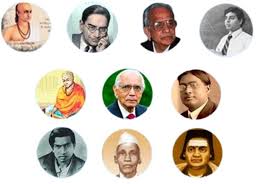
Indian Mathematicians and Their Contributions
India has a long and rich tradition of mathematics that spans thousands of years. Many Indian mathematicians have made groundbreaking contributions to various branches of mathematics, including algebra, geometry, number theory, calculus, and astronomy. Here are some prominent Indian mathematicians and their contributions:
1. Aryabhata (476–550 CE)
- Contributions: Aryabhata is one of the most renowned ancient Indian mathematicians and astronomers. His work laid the foundations for many aspects of mathematics and astronomy.
- Key Achievements:
- Introduced the concept of zero as a placeholder in positional number systems.
- Developed methods for calculating pi (π\pi) and determined its value to be approximately 3.1416.
- Formulated an early version of the Pythagorean theorem.
- Aryabhata also gave a correct explanation of eclipses and worked on the approximation of the sine function.
2. Brahmagupta (598–668 CE)
- Contributions: Brahmagupta was an influential Indian mathematician and astronomer who made pioneering contributions in algebra and arithmetic.
- Key Achievements:
- Zero and negative numbers: Brahmagupta was the first to define zero and negative numbers in a systematic way, providing rules for their use in arithmetic operations.
- Developed formulas for solving quadratic equations.
- Introduced the method of finding the area of cyclic quadrilaterals (a polygon with four sides whose vertices lie on a circle).
- His work in astronomy and geometry was highly influential in both the Islamic world and medieval Europe.
3. Bhaskara I (600–680 CE)
- Contributions: A prominent mathematician and astronomer, Bhaskara I made significant contributions to algebra and trigonometry.
- Key Achievements:
- Worked extensively on sine tables and introduced methods to approximate values of trigonometric functions.
- Made early contributions to solving linear and quadratic equations.
- He is also known for correcting some of Aryabhata’s astronomical calculations.
4. Bhaskara II (1114–1185 CE)
- Contributions: Known as Bhaskaracharya, Bhaskara II was a great mathematician and astronomer, considered one of the last great Indian mathematicians of the classical period.
- Key Achievements:
- Wrote Lilavati, a famous treatise on arithmetic and algebra.
- He is known for providing methods for solving indeterminate equations (the Brahmagupta-Bhaskara equation).
- Developed a form of the Pythagorean theorem and worked on trigonometric identities.
- Bhaskara’s Theorem: A formula used to solve diophantine equations (equations that seek integer solutions).
- Provided methods for calculating the volume of solids and solving problems in calculus (like differentiation and integration), predating Newton and Leibniz.
5. Madhava of Sangamagrama (1340–1425 CE)
- Contributions: Madhava was an Indian mathematician and astronomer who is often credited as the founder of the Kerala School of Astronomy and Mathematics.
- Key Achievements:
- Infinite series for sine, cosine, and arctangent: Madhava discovered the infinite series expansions for trigonometric functions, centuries before these were known in Europe.
- Contributed to the early development of calculus by discovering concepts of differentiation and integration.
- Developed methods for approximating pi using infinite series.
- His work formed the foundation for the Kerala School, which influenced later mathematicians like Nilakantha and Jyeshthadeva.
6. Srinivasa Ramanujan (1887–1920)
- Contributions: Srinivasa Ramanujan is perhaps one of the most famous Indian mathematicians, known for his groundbreaking work in number theory, continued fractions, and infinite series.
- Key Achievements:
- Ramanujan’s tau function and the Ramanujan prime are well-known concepts in number theory.
- He developed a rapidly converging series for calculating pi and discovered new properties of modular forms.
- Ramanujan was largely self-taught and had an extraordinary ability to generate complex results without formal training.
- His work on partition functions and mock theta functions is still highly influential in modern mathematics.
- Many of his formulas continue to be used in number theory, combinatorics, and cryptography.
7. Nilakantha (1444–1544 CE)
- Contributions: Nilakantha was a mathematician and astronomer from the Kerala School of Mathematics who made significant contributions to calculus.
- Key Achievements:
- Nilakantha’s series for pi was a major breakthrough. This was an infinite series for calculating pi that was more accurate than the earlier ones.
- He worked extensively on trigonometry and astronomy, and his work on planetary motion influenced future astronomical theories.
- Nilakantha is also credited with finding solutions to geometric problems using infinite series.
8. Jayadeva (around 1000 CE)
- Contributions: Jayadeva was another mathematician and poet who contributed to the development of trigonometry and astronomy.
- Key Achievements:
- Known for his work on sine functions and their use in astronomical calculations.
- His works on spherical geometry had an impact on future astronomical computations.
9. Vashishtha (around 200 BCE)
- Contributions: Vashishtha is believed to have made significant contributions in the field of geometry.
- Key Achievements:
- Worked on the construction of altars, an early application of geometry in Hindu rituals.
- Contributed to the understanding of geometric proportions and basic trigonometric concepts.
10. Akhil Rathi (Contemporary Mathematician)
- Contributions: A contemporary Indian mathematician known for his work in mathematical modeling and theoretical physics.
- Key Achievements:
- His research includes the development of mathematical algorithms for computational analysis.
- He has worked on the application of mathematics in solving real-world problems in physics and engineering.
Conclusion:
Indian mathematicians have a rich history of contributing to various mathematical fields, from algebra and geometry to number theory and calculus. Figures like Aryabhata, Brahmagupta, and Ramanujan made remarkable contributions that continue to influence modern mathematics. Their work laid the foundation for much of the mathematical knowledge we have today, showcasing the depth and sophistication of India’s ancient and modern mathematical traditions.

Leave a Reply